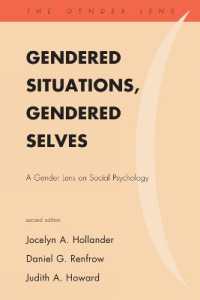- ホーム
- > 洋書
- > 英文書
- > Science / Mathematics
Full Description
This book comprehends the characteristics, creation, and utilization of biofuels derived from different feedstocks like edible oil, non-edible oil, cooked waste, chicken fat, and algae. It covers recent energy scenarios, environmental issues and solutions, biodiesel production techniques, and the optimization of process parameters, such as the selection of feedstock for biofuels production. Bioethanol production from different feedstocks and pretreatment techniques, biogas upgrading technology, storage, and utilization in dual fuel engines is also included.
Features:
Discusses the production and application of the low/zero-carbon fuel
Provides information on the legislation and standards for the adoption of these fuels
Includes statistical data and pricing of the current situation of raw materials, products, and utilities costs
Explores the adoption of machine-learning algorithms like ANN for the production processes
Consider safety aspects, regulatory policies, and sustainable use directions
This book is aimed at graduate students and researchers in chemical and mechanical engineering, alternative fuels, and combustion engines.
Contents
1 Introduction to Energy Sources, Scenario, Pollution Problems, and Solutions; 2 Multi-Objective Optimization of Biodiesel Production through Neural Network, Machine Learning, and Genetic Algorithm: A Critical Review; 3 Critical Review of Feedstock Choices for Biodiesel Production: First, Second, and Third Generation Sources; 4 Fuel for Internal Combustion Engines from Plastic Waste; 5 Conversion of Municipal Solid Wastes to Fuels and Solid Waste Management; 6 Bioethanol Production from Lignocellulosic Biomass and Pretreatment Techniques; 7 Biogas Production from Lignocellulosic Biomass and Pretreatment Techniques; 8 Biogas Upgrading Technologies, Storage, and Utilization in IC Engines; 9 Hydrogen as Fuel: Global and National Status; 10 Green Ammonia Production and Its Usage in Dual-Fuel Engines; 11 Impact of Fuel Injection Pressure on Diesel Engine Characteristics Powered by Semecarpus Anacardium Methyl Ester: Exergy and Energy Analysis; 12 Modeling and Prediction of Reducing Sugar Yield of Mixed Vegetable Wastes Biomass Using Response Surface Methodology; 13 Selection of Pretreatment Technologies for Sustainable Bio-ethanol Production from Lignocellulosic Biomass Using Hybrid MCDM: Python Approach; 14 Experimental Investigation of CI Engine Characteristics Powered with Linseed-Pine Oil Blend; 15 Integration of Carbon Capture and Storage with Renewable Energy; 16 Hydrogen Novel Storage Methods and Materials; 17 Hydrogen Production Methods and Advances: Their Separation and Purification Methods; 18 The Hydrogen Storage Techniques: A Critical Review for a Recent Advancements; 19 Hydrogen Utilization in ICEs and Fuel Cells and the Challenges Associated; 20 Hydrogen Classification, Regulation, Codes, Standards, and Future Directions; 21 Assessment of the Effect of Hydrogen Induction on CI Engine Characteristics Fueled with Neem Oil-Diesel Blend: Response Surface Approach








